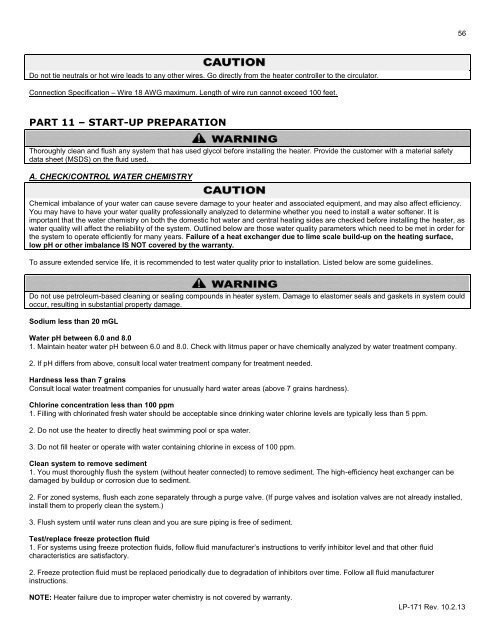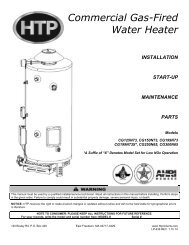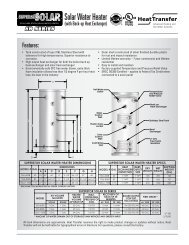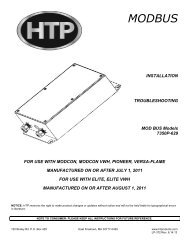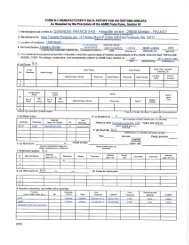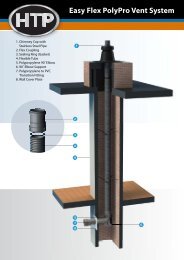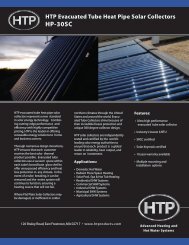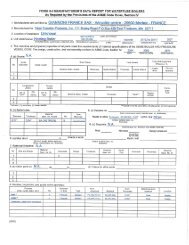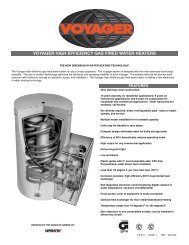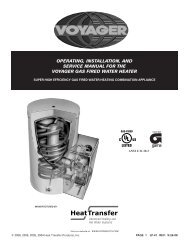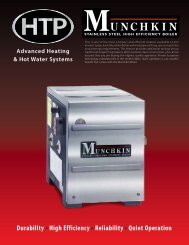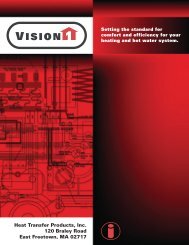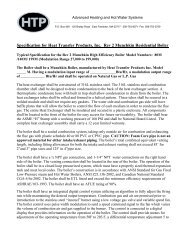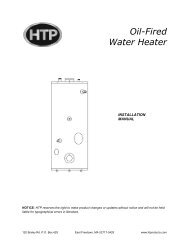MC Series Gas-Fired Circulating Heater - Heat Transfer Products, Inc
MC Series Gas-Fired Circulating Heater - Heat Transfer Products, Inc
MC Series Gas-Fired Circulating Heater - Heat Transfer Products, Inc
Create successful ePaper yourself
Turn your PDF publications into a flip-book with our unique Google optimized e-Paper software.
56<br />
Do not tie neutrals or hot wire leads to any other wires. Go directly from the heater controller to the circulator.<br />
Connection Specification – Wire 18 AWG maximum. Length of wire run cannot exceed 100 feet.<br />
PART 11 – START-UP PREPARATION<br />
Thoroughly clean and flush any system that has used glycol before installing the heater. Provide the customer with a material safety<br />
data sheet (MSDS) on the fluid used.<br />
A. CHECK/CONTROL WATER CHEMISTRY<br />
Chemical imbalance of your water can cause severe damage to your heater and associated equipment, and may also affect efficiency.<br />
You may have to have your water quality professionally analyzed to determine whether you need to install a water softener. It is<br />
important that the water chemistry on both the domestic hot water and central heating sides are checked before installing the heater, as<br />
water quality will affect the reliability of the system. Outlined below are those water quality parameters which need to be met in order for<br />
the system to operate efficiently for many years. Failure of a heat exchanger due to lime scale build-up on the heating surface,<br />
low pH or other imbalance IS NOT covered by the warranty.<br />
To assure extended service life, it is recommended to test water quality prior to installation. Listed below are some guidelines.<br />
Do not use petroleum-based cleaning or sealing compounds in heater system. Damage to elastomer seals and gaskets in system could<br />
occur, resulting in substantial property damage.<br />
Sodium less than 20 mGL<br />
Water pH between 6.0 and 8.0<br />
1. Maintain heater water pH between 6.0 and 8.0. Check with litmus paper or have chemically analyzed by water treatment company.<br />
2. If pH differs from above, consult local water treatment company for treatment needed.<br />
Hardness less than 7 grains<br />
Consult local water treatment companies for unusually hard water areas (above 7 grains hardness).<br />
Chlorine concentration less than 100 ppm<br />
1. Filling with chlorinated fresh water should be acceptable since drinking water chlorine levels are typically less than 5 ppm.<br />
2. Do not use the heater to directly heat swimming pool or spa water.<br />
3. Do not fill heater or operate with water containing chlorine in excess of 100 ppm.<br />
Clean system to remove sediment<br />
1. You must thoroughly flush the system (without heater connected) to remove sediment. The high-efficiency heat exchanger can be<br />
damaged by buildup or corrosion due to sediment.<br />
2. For zoned systems, flush each zone separately through a purge valve. (If purge valves and isolation valves are not already installed,<br />
install them to properly clean the system.)<br />
3. Flush system until water runs clean and you are sure piping is free of sediment.<br />
Test/replace freeze protection fluid<br />
1. For systems using freeze protection fluids, follow fluid manufacturer’s instructions to verify inhibitor level and that other fluid<br />
characteristics are satisfactory.<br />
2. Freeze protection fluid must be replaced periodically due to degradation of inhibitors over time. Follow all fluid manufacturer<br />
instructions.<br />
NOTE: <strong><strong>Heat</strong>er</strong> failure due to improper water chemistry is not covered by warranty.<br />
LP-171 Rev. 10.2.13


